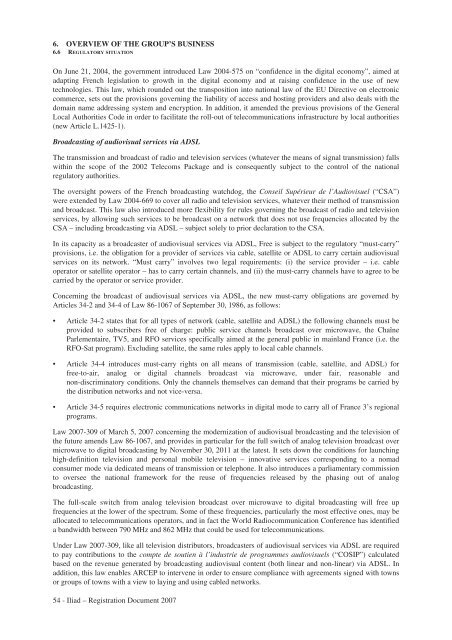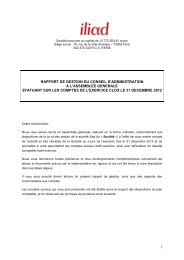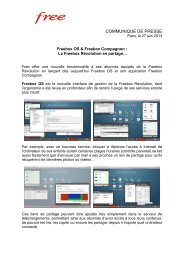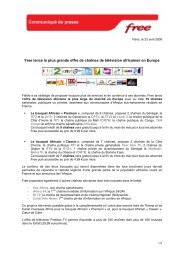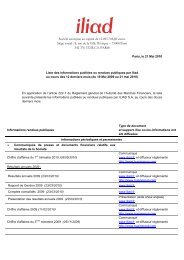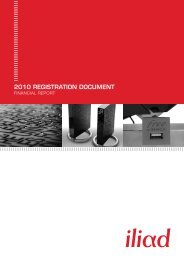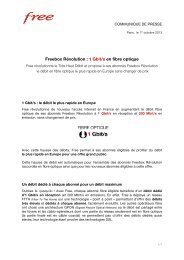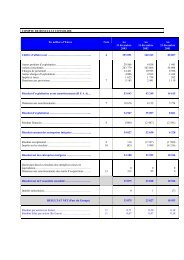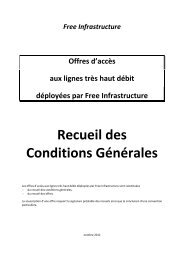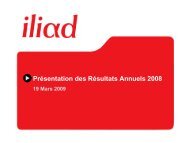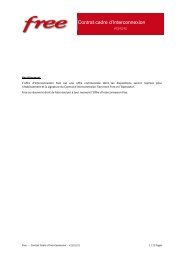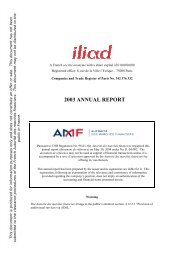REGISTRATION DOCUMENT AND FINANCIAL REPORT - Iliad
REGISTRATION DOCUMENT AND FINANCIAL REPORT - Iliad
REGISTRATION DOCUMENT AND FINANCIAL REPORT - Iliad
- TAGS
- registration
- iliad
- iliad.fr
You also want an ePaper? Increase the reach of your titles
YUMPU automatically turns print PDFs into web optimized ePapers that Google loves.
6. OVERVIEW OF THE GROUP’S BUSINESS<br />
6.6 REGULATORY SITUATION<br />
On June 21, 2004, the government introduced Law 2004-575 on “confidence in the digital economy”, aimed at<br />
adapting French legislation to growth in the digital economy and at raising confidence in the use of new<br />
technologies. This law, which rounded out the transposition into national law of the EU Directive on electronic<br />
commerce, sets out the provisions governing the liability of access and hosting providers and also deals with the<br />
domain name addressing system and encryption. In addition, it amended the previous provisions of the General<br />
Local Authorities Code in order to facilitate the roll-out of telecommunications infrastructure by local authorities<br />
(new Article L.1425-1).<br />
Broadcasting of audiovisual services via ADSL<br />
The transmission and broadcast of radio and television services (whatever the means of signal transmission) falls<br />
within the scope of the 2002 Telecoms Package and is consequently subject to the control of the national<br />
regulatory authorities.<br />
The oversight powers of the French broadcasting watchdog, the Conseil Supérieur de l’Audiovisuel (“CSA”)<br />
were extended by Law 2004-669 to cover all radio and television services, whatever their method of transmission<br />
and broadcast. This law also introduced more flexibility for rules governing the broadcast of radio and television<br />
services, by allowing such services to be broadcast on a network that does not use frequencies allocated by the<br />
CSA – including broadcasting via ADSL – subject solely to prior declaration to the CSA.<br />
In its capacity as a broadcaster of audiovisual services via ADSL, Free is subject to the regulatory “must-carry”<br />
provisions, i.e. the obligation for a provider of services via cable, satellite or ADSL to carry certain audiovisual<br />
services on its network. “Must carry” involves two legal requirements: (i) the service provider – i.e. cable<br />
operator or satellite operator – has to carry certain channels, and (ii) the must-carry channels have to agree to be<br />
carried by the operator or service provider.<br />
Concerning the broadcast of audiovisual services via ADSL, the new must-carry obligations are governed by<br />
Articles 34-2 and 34-4 of Law 86-1067 of September 30, 1986, as follows:<br />
• Article 34-2 states that for all types of network (cable, satellite and ADSL) the following channels must be<br />
provided to subscribers free of charge: public service channels broadcast over microwave, the Chaîne<br />
Parlementaire, TV5, and RFO services specifically aimed at the general public in mainland France (i.e. the<br />
RFO-Sat program). Excluding satellite, the same rules apply to local cable channels.<br />
• Article 34-4 introduces must-carry rights on all means of transmission (cable, satellite, and ADSL) for<br />
free-to-air, analog or digital channels broadcast via microwave, under fair, reasonable and<br />
non-discriminatory conditions. Only the channels themselves can demand that their programs be carried by<br />
the distribution networks and not vice-versa.<br />
• Article 34-5 requires electronic communications networks in digital mode to carry all of France 3’s regional<br />
programs.<br />
Law 2007-309 of March 5, 2007 concerning the modernization of audiovisual broadcasting and the television of<br />
the future amends Law 86-1067, and provides in particular for the full switch of analog television broadcast over<br />
microwave to digital broadcasting by November 30, 2011 at the latest. It sets down the conditions for launching<br />
high-definition television and personal mobile television – innovative services corresponding to a nomad<br />
consumer mode via dedicated means of transmission or telephone. It also introduces a parliamentary commission<br />
to oversee the national framework for the reuse of frequencies released by the phasing out of analog<br />
broadcasting.<br />
The full-scale switch from analog television broadcast over microwave to digital broadcasting will free up<br />
frequencies at the lower of the spectrum. Some of these frequencies, particularly the most effective ones, may be<br />
allocated to telecommunications operators, and in fact the World Radiocommunication Conference has identified<br />
a bandwidth between 790 MHz and 862 MHz that could be used for telecommunications.<br />
Under Law 2007-309, like all television distributors, broadcasters of audiovisual services via ADSL are required<br />
to pay contributions to the compte de soutien à l’industrie de programmes audiovisuels (“COSIP”) calculated<br />
based on the revenue generated by broadcasting audiovisual content (both linear and non-linear) via ADSL. In<br />
addition, this law enables ARCEP to intervene in order to ensure compliance with agreements signed with towns<br />
or groups of towns with a view to laying and using cabled networks.<br />
54 - <strong>Iliad</strong> – Registration Document 2007


